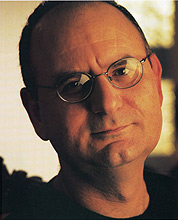Berkeleyan
Policing thought after 9/11
An interview with historian Beshara Doumani on threats to academic freedom and the looming privatization of Middle East studies
![]()
| 01 March 2006
"Academic freedom is facing its most serious threat since the McCarthy era of the 1950s," according to Beshara Doumani, associate professor of history. University campuses are threatened with the combined forces of coercion and privatization, he says, leaving the academy more vulnerable than ever to outside political and economic forces.
 Besahra Doumani (Photo courtesy Zone Books) |
A Palestinian whose academic specialty is the modern social history of the Middle East, Doumani has taken time from his usual field of study to examine the historical, legal, and social interpretations of academic free speech in this country. Two years ago he organized a conference at Berkeley on the topic; he has now edited a book based on that conference, Academic Freedom After September 11, which will be published this month by Zone Books.
The book is divided into two sections, "Contending Visions" and "Praxis," each section containing three essays. The contending visions are whether academic freedom is best based on tenets of individual freedom, backed by the First Amendment, or on professional privilege - professors' rights to regulate their affairs according to their own standards. Former Berkeley law professor Robert Post, now at Yale; Judith Butler, the Maxine Elliot Professor of Rhetoric and Comparative Literature here; and political scientist Philippa Strum analyze and debate these and other issues in part one.
Part two takes a look at specific challenges to academic freedom, past and present. It includes an essay by Berkeley Assistant Professor of History Kathleen Frydl on "freedom in the multiversity," focusing on the Loyalty Oath controversy (1949-52) and the Free Speech Movement (1964) at Berkeley. Stanford professor of Middle East history Joel Beinin contributes "The New McCarthyism: Policing Thought About the Middle East." And Amy Newhall, executive director of the Middle East Studies Association of North America, tackles the history and politics of language-acquisition programs in the United States.
Doumani himself contributes a 50-page introduction, not the usual summing-up of a book's content but an attempt "to understand the significance and the exceptionalism of the post-9/11 moment when it comes to the roller-coaster history of academic freedom."
'Fundamental shifts in political culture'
In a recent interview in his Dwinelle Hall office, Doumani points out that spirited arguments for and against academic freedom tend to occur during times of war - major stands in favor of academic freedom were taken by the American Association of University Professors in 1915 and 1940 - but that there is something new and more threatening to this freedom after September 11 and the advent of the "war on terrorism."
Doumani believes that "there is a general attack on the fundamental culture of democracy in this country. What's happening to the academy is very similar to what has happened to the press, to civil liberties under the Patriot Act, and to other sectors of American life and society. This is about fundamental shifts in political culture."
During the McCarthy era, federal intelligence agencies used the Cold War as a reason to impose various restrictions, including on academic freedom. "Now," Doumani says, "private groups are playing the leading role in conducting national, and well-funded, campaigns to police thought in the academy." He points to such movements as Campus Watch, which targets Middle East scholars and programs critical of U.S. foreign policy and of Israel; David Horowitz's right-wing "Academic Bill of Rights" campaign, which aims to "balance" the "liberal academy"; and the American Council of Trustees and Alumni - co-founded by Lynne Cheney, the wife of the vice president - which has called universities the weak link in the war against terror.
The freedom to pursue critical thinking about the Middle East has come under special attack, amply documented in Academic Freedom After September 11. Doumani says he is not concerned for himself - he has tenure - but he does worry about younger teachers and graduate students. "The important question today is not so much who is fired, but who is hired - how certain lines of inquiry and research and fields of study are being made radioactive, and whether the resources of higher education are being marshaled for the private good instead of the public good."
And if various sorts of coercion in the form of government legislation - for instance, House Resolution 3077, a recent, unsuccessful attempt to set up an outside "advisory board" to oversee Title VI funding for area-studies centers - can't get the job done, Doumani fears that privatization could.
"There are efforts outside the academy to privatize Middle East studies," he says. "The desire is to defund Middle East centers and then establish think tanks that will provide for the press and government a ready stable of 'experts,' who can shape knowledge about the Middle East." What's at stake, fears Doumani, is what academics hold most dear: the use of critical reason in the free pursuit of knowledge.
"Since 9/11, the two movements of privatization and coercion are intersecting," Doumani concludes. "This creates a situation which demands of us that we not only stand up and defend academic freedom, but that we ask ourselves: What is academic freedom? How is it relevant to the new phase of the academy and the political system in this country? And, importantly, what is the role of the intellectual in this society?"
Russell Schoch, former editor of California Monthly, is a writer and editor who lives in Berkeley.

